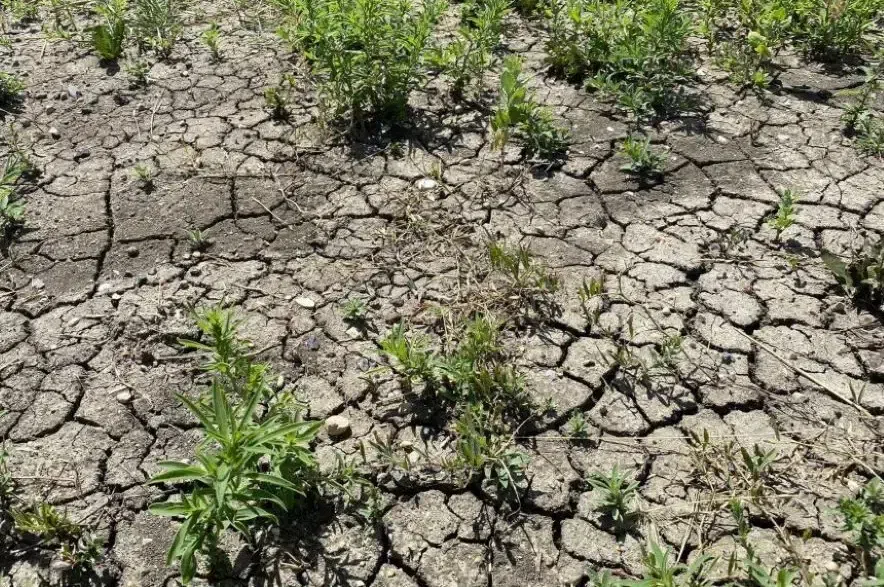Farmers in southwest Saskatchewan are sounding the alarm after nine straight years of drought pushed the RM of Big Stick to formally declare a state of emergency.
“We’ve had just three-tenths (of a inch) of rain since the snow melted,” said Tyson Jacksteit, who runs a 7,000-acre mixed operation in the area. “Our hay’s a quarter of what it was. There’s no feed and no sign of relief.”
Read more:
- AgriStability enhancements get mixed reaction from Sask. government
- Federal AgriStability cap to double to help with Chinese canola tariffs impact
- Wildfire smoke shapes weather patterns, and not for the better
Tyson said the ongoing dry conditions are threatening the viability of his farm and many others nearby.
Without moisture, feed for cattle is limited and crop yields aren’t covering the cost of inputs like seed and fertilizer.
The declaration, issued by Big Stick council last week, highlights the growing pressure on both cattle producers and grain growers in the region. Local leaders say more RMs are expected to follow if conditions remain dry.
Reeve Quinton Jacksteit, Tyson’s brother, said the drought’s long duration has exposed deep flaws in the province’s crop insurance system.
“The current crop insurance programs don’t fit anymore,” he said. “They don’t support farmers like they were designed to.”
Quinton Jacksteit said the programs aren’t responsive to multi-year droughts, with many producers reporting yields too low to cover input costs, yet still not triggering payouts.
“Things have changed,” he added. “The weather’s changed. The economics have changed. But the insurance hasn’t.”
On Monday, the Saskatchewan NDP joined calls for immediate government action. Saskatchewan Crop Insurance Corporation and agriculture critic Trent Wotherspoon urged both the provincial and federal governments to deliver support before more producers are forced to shut down or sell off livestock.
“Our cattle producers produce the best beef in the world and they need our support when we see the threat of drought putting livelihoods at risk,” Wotherspoon said in a statement.
The NDP is calling for three urgent measures:
- A drought action committee led by rural municipalities and industry groups to coordinate emergency response.
- Equity in business risk management, with government cost-sharing on livestock insurance premiums as is already done for crop producers.
- A 10-year capital gains deferral for ranchers forced to sell cattle due to drought, an idea backed by the Saskatchewan Stock Growers Association.
“We’re all hoping for a solid rain,” Wotherspoon said. “But this is a time for strength in leadership, it’s time to stand shoulder to shoulder with our cattle producers.”
Both Quinton and Tyson Jacksteit say the longer this drought continues, the more pressure builds not only financially but emotionally.
“It’s year nine,” said Quinton, “and this might be the worst yet.”
Read more:











